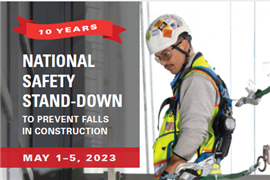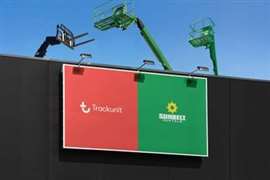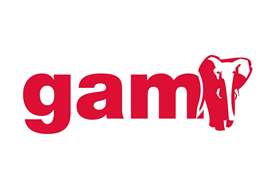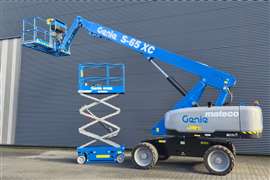Are you keeping your MEWP operator safe?
26 May 2023
Protecting the operator in the basket is at the top of the MEWP safety list – AI explores developments.
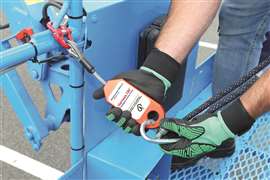 The Harness ON Intelligent Anchor Point Phase 2 is being fitted to MEWPs. (PHOTO: Nationwide Platform)
The Harness ON Intelligent Anchor Point Phase 2 is being fitted to MEWPs. (PHOTO: Nationwide Platform)
Nationwide Platforms’ new version of its Harness On safety device, which the company has described as a gamechanger, won the attention of the IAPA award judges.
The judges chose it as the winner of Innovative Technology Prize, presented at a ceremony in Berlin on 20 April.
Harness ON Intelligent Anchor Point Phase 2, dubbed the ‘seatbelt’ for MEWPs, was launched back in September last year at Nationwide Platforms’ Working at Height conference. It ensures operators are correctly secured to the machine during working operations.
The UK rental company had previously introduced Harness ON Phase 1 in 2021 following extensive trials; however, it was recognised that it had some operational limitations, primarily because it restricts the operator to using a specific lanyard.
Within large, fast moving site operations, this limitation can cause some difficulties in ensuring all relevant site operators have the correct lanyard.
The Harness ON Phase 2 system maintains all the benefits of the original Phase 1 device but no longer requires a specific lanyard, improving efficiency while reducing risk.
It has a patented ring, meaning the operator must connect their carabiner to the Harness On Intelligent Anchor Point instead of to the machine rails. Once connected, an electrical current will flow and switch the machine on. Without this connection the machine simply will not work.
If the harness is disconnected while a MEWP is in use, the machine will become inoperable until reconnection to the anchor point has been made. The patented inductive ring enables activation using a standard lanyard and an LED light illuminates when a harness is connected via the carabiner, allowing for visual confirmation of connection and early fault diagnosis.
Harness On safety system
Since it was launched in September, Nationwide has been working to roll it out across its own fleet and the wider industry.
“We have a number of units which we are currently fitting to our boom lifts and are busy visiting our customers and attending safety days to demonstrate Harness ON and the additional safety benefits the device can provide onsite,” said the company.
In addition to the boom fleet, the company is rolling out the fitting of Harness ON across its 26m and above Specialist Vehicle operated trucks to show its commitment and ensure the safety of its operators.
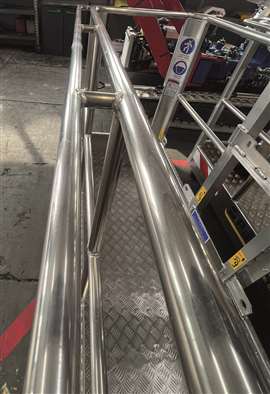 Palazzani’s Hand Protector. (PHOTO: Palazzani)
Palazzani’s Hand Protector. (PHOTO: Palazzani)
“There has been a huge level of interest from OEMs and competitors since Working at Height and we have made changes to our supply chain to ensure that we can manufacture the volumes needed to meet the demand from the industry.
“We anticipate this level of manufacturing to be increased ten-fold in the next month and the additional safety benefits from Harness ON being recognised and felt far and wide.”
Hand protection for MEWP operators
Remaining on the subject of safety in the basket Palazzani has introduced its Hand Protector; a 20 mm tube positioned on the three outer upper sides of the basket with an internal space of 50mm to avoid possible entrapment or crushing of the hands of the operators in case of collision with an obstacle.
As the manufacturer points out, accidents at height are not always potentially fatal, they can be minor bumps, which can cause serious injuries to the operator’s hands. These accessories allow you to operate at height with greater safety.
It complements the company’s secondary guarding system, that has sensors and lasers that can be positioned on the five sides of the basket, including the base, to provide total protection.
Safety in an emergency
Following a deep analysis of accidents, the company found that the third most common cause of serious injuries follows entrapment or crushing.
This led to the introduction of its emergency stop button.
“An operator hitting a fixed structure is often unable to stop the dangerous movement in time.” said Pallazzani.
“The analysis suggested that the best position for the emergency stop push button is not always the one closest to the operator, and consequently we have added an emergency stop further than the control panel and within the operator and passengers arm’s reach.”
Find out more about Palazzani’s spider lift products in the feature of the same name in this issue of the magazine. See also the APEX Show guide for more spider news.
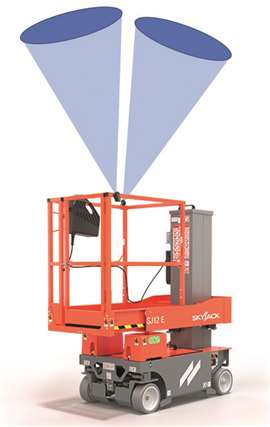 The MEWP Shield sensor detection zones. (IMAGE: Protective)
The MEWP Shield sensor detection zones. (IMAGE: Protective)
MEWP safety technology
Continuing on the theme of protection in the basket, MEWP Shield Scissor from Australia-based Protective pty was also on the shortlist at the IAPAs, along with another one of its devices, the GoUpSafely (GUS) detection for high voltage power sources.
Shield Scissor is a secondary guarding system using ultrasonic sensors.
The sensors are fitted to the machine to detect both overhead and shearing obstacles, alert the operator, and prevent the machine from hitting identified hazards.
It is unique, says the company, in that it prevents crushing incidents before they happen protecting all basket occupants, not just the operator.
It also prevents both machinery and property from physical damage.
Traditional crush guard systems such as pressure bars and physical barriers require physical contact to engage, says the company.
This means an actual incident has to occur to some degree before these systems offer protection. Damage and lost time incidents are common due to these incidents.
Protective approached the problem a bit differently. A company spokesperson said, “We focused on detection of hazards external to the basket alerting the operator to potential danger before they are in it and ultimately stopping the machine before it reaches predesignated proximity limits.
“Using patented software filtering and sensing technology, MEWP shield can detect specific hazards external to the platform.
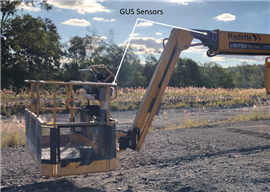 High voltage control from the GUS bucket. (PHOTO: Protective)
High voltage control from the GUS bucket. (PHOTO: Protective)
Managing safety around power lines
Protective’s GoUpSafely (GUS) provides an engineered control for the detection of high-voltage power sources, essentially powerlines, within the safe operating range of the aerial machine.
GUS is designed to detect the proximity of energized overhead AC 50Hz or 60Hz electrical transmission lines by measuring the strength of E-field in the atmosphere and then applying an algorithm via patented software to determine a multiple of flashover distance. When a hazard is detected, GUS alerts the operator keeping the machine and operator safe from risk.
When employing the optional interlock function, GUS alerts the operator via audio and visual alerts. If motion continues towards the HV source, GUS will inhibit the machine from continuing in the current direction of movement but allows movement away from the hazard until it is cleared. It also allows movement away from the hazard.
A patented system filters out nuissance alerts from non-HV power sources. It can then provide an indication alert or a stop motion function. The unit is easily retrofittable to a majority of aerial equipment
One feature is the closed MILSPEC wireless network for sensors eliminating radio interference on site, while another is the IP67 rated with ruggedized sensor housings. Solar powered wireless sensors perform for more than 30 days on one full charge, while there is an option to add DC detection. The communication range is up to 150m.
A spokesman said, “The average incident involving powerlines represents a cost of $160,000 per incident in damages, according to OSHA.
“Therefore, GUS is an affordable virtual insurance policy for aerial machine owners against HV power related incidents.”
GUS was one of the items in Protective Pty’s IAPA shortlisted Safe Working at Heigh entry.
STAY CONNECTED



Receive the information you need when you need it through our world-leading magazines, newsletters and daily briefings.
CONNECT WITH THE TEAM










